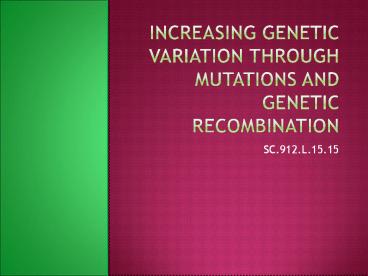Increasing genetic variation through mutations and genetic recombination - PowerPoint PPT Presentation
1 / 14
Title:
Increasing genetic variation through mutations and genetic recombination
Description:
Title: Increasing genetic variation through mutations and genetic recombination Author: Administrator Last modified by: Administrator Created Date – PowerPoint PPT presentation
Number of Views:311
Avg rating:3.0/5.0
Title: Increasing genetic variation through mutations and genetic recombination
1
Increasing genetic variation through mutations
and genetic recombination
- SC.912.L.15.15
2
Two processes produce the variation in gene pools
that contributes to differences among individuals
3
- Mutations
- Genetic Recombination (sexual reproduction)
4
Genetic Mutations
- Mutations are the raw material of evolutionary
change. - changes in the nucleotide sequence of DNA
- Mutation introduces new variation into a
population. - cause new genes and alleles to arise
- This variation is adaptive if it helps members of
a population adjust to specific environmental
conditions.
5
Effects of mutations
- Change in a morphological trait. This refers to
an obvious change in some physical characteristic
of an organism. (for example, short plants
instead of tall) - Change in behavior. In one example, Drosophila
(fruit fly) mating behavior was found to be
affected by a mutation. Mutant male flies were no
longer able to distinguish between males and
females, and tried to mate with any fly
available!
6
Effects of mutations
- Lethality. Some mutations are lethal to an
organism, like the yellow coat color allele in
mice or the Huntington's allele of humans - When lethal, the allele is not usually passed on,
as the organism will usually die before
reproducing
7
Genetic Recombination
- Sexual reproduction can shuffle existing alleles
into new combinations - In organisms that reproduce sexually,
recombination of alleles is more important than
mutation in producing the genetic differences
that make adaptation possible
8
Genetic Variation
- Variation in individual genotype leads to
variation in individual phenotype - Not all phenotypic variation is heritable
- Natural selection can only act on variation with
a genetic component
9
- Think about this.
10
A Deadly Example of Evolution in Progress HIV
Human Immunodeficiency Virus The causative agent
of AIDS (Acquired Immune Deficiency
Syndrome) HIV is a type of retrovirus that
attacks cellular components of the human immune
system by reversing the normal process of DNA
transcription.
11
Through genetic analysis of the viral RNA, a
family tree of HIV and related viruses can be
constructed. This phylogeny shows that monkeys
were the original source of the virus that jumped
to humans and became HIV.
12
We can plot the genetic differences among strains
of HIV over the 20 years of available
data. Extrapolating a best-fit line to those
data allows us to estimate the time when there
was zero genetic difference within a
strain. Dates the common ancestor of HIV and SIV
back to 1930.
13
What does HIV/AIDS teach us about evolution? Due
to the reverse transcription process, the genetic
diversity of HIV increases substantially as the
virus spreads through a human population. Some
variants of the virus replicate while others die,
and as a result the composition of the population
changes over time. That is, the viral population
evolves, and continues to do so at an extremely
rapid rate.
HIVs potential for rapid evolution has profound
consequences. Within infected individuals HIV
populations quickly evolve resistance to
antiretroviral drugs. Without these drugs, HIV
populations continuously evolve to evade the
human hosts immune defenses. HIV evolution is
thus an example of natural selection in action
which emphasizes the importance of genetic
variation and how environments determine the
direction of change.
14
In your own words
- Write a few sentences about how genetic variation
among the HIVs (a virus) population has allowed
it to survive so long in the human population,
despite various attempts from humans to develop a
vaccine to get rid of HIV. - How does this relate to genetic variation in the
human populations ability to survive malaria?































